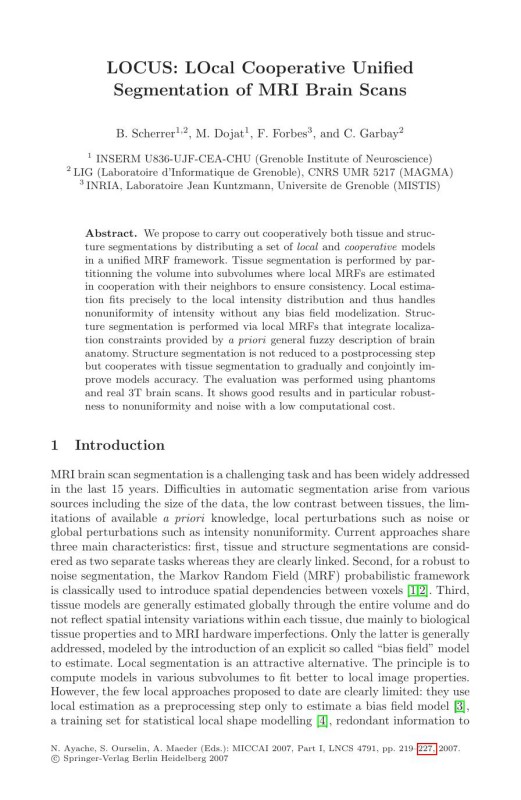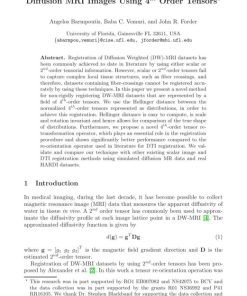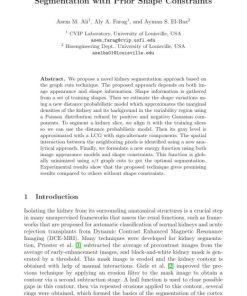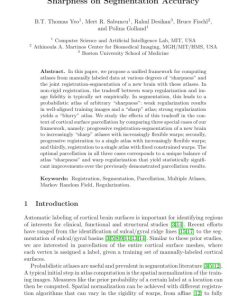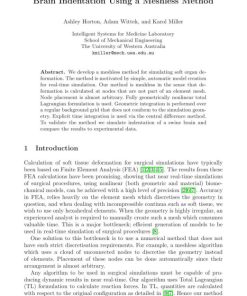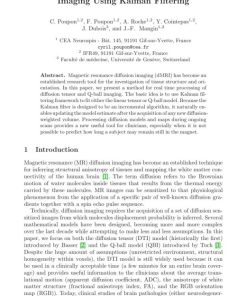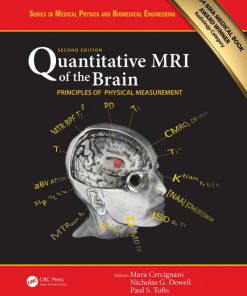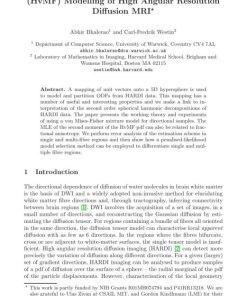LOCUS: LOcal Cooperative Unified Segmentation of MRI Brain Scans 1st Edition by B Scherrer, M Dojat, F Forbes, C Garbay ISBN 9783540757573
$50.00 Original price was: $50.00.$25.00Current price is: $25.00.
Authors:B. Scherrer, M. Dojat, F. Forbes; C. Garbay , Tags:Medical Image Computing and Computer-Assisted Intervention – MICCAI 2007 , Author sort:B. Scherrer, M. Dojat, F. Forbes & Garbay, C. , Languages:Languages:eng , Comments:Comments:Medical Image Computing and Computer-Assisted Intervention – MICCAI 2007
LOCUS: LOcal Cooperative Unified Segmentation of MRI Brain Scans 1st Edition by B Scherrer, M Dojat, F Forbes, C Garbay – Ebook PDF Instant Download/Delivery. 9783540757573
Full download LOCUS: LOcal Cooperative Unified Segmentation of MRI Brain Scans 1st Edition after payment
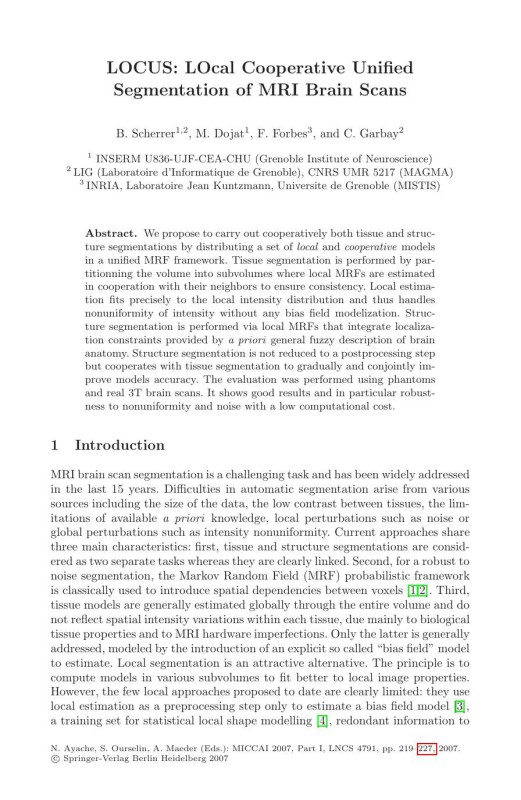
Product details:
ISBN 10:
ISBN 13: 9783540757573
Author: B Scherrer, M Dojat, F Forbes, C Garbay
We propose to carry out cooperatively both tissue and structure segmentations by distributing a set of local and cooperative models in a unified MRF framework. Tissue segmentation is performed by partitionning the volume into subvolumes where local MRFs are estimated in cooperation with their neighbors to ensure consistency. Local estimation fits precisely to the local intensity distribution and thus handles nonuniformity of intensity without any bias field modelization. Structure segmentation is performed via local MRFs that integrate localization constraints provided by a priori general fuzzy description of brain anatomy. Structure segmentation is not reduced to a postprocessing step but cooperates with tissue segmentation to gradually and conjointly improve models accuracy. The evaluation was performed using phantoms and real 3T brain scans. It shows good results and in particular robustness to nonuniformity and noise with a low computational cost.
LOCUS: LOcal Cooperative Unified Segmentation of MRI Brain Scans 1st Table of contents:
-
Introduction
1.1 Motivation and Background
1.2 Importance of MRI Brain Segmentation
1.3 Challenges in MRI Brain Scan Segmentation
1.4 The Concept of Local Cooperative Segmentation
1.5 Key Contributions and Objectives of the Paper
1.6 Structure of the Paper -
Preliminaries
2.1 Overview of Brain MRI Imaging
2.2 Current Approaches to Brain Scan Segmentation
2.3 Limitations of Traditional Segmentation Methods (e.g., Region-Based, Edge-Based)
2.4 Cooperative Methods in Image Segmentation
2.5 Related Work in MRI Brain Segmentation and Cooperative Techniques -
LOCUS Framework
3.1 Definition and Overview of the LOCUS Method
3.2 Local Segmentation Approaches in MRI Imaging
3.3 Cooperative Segmentation: Concept and Mechanisms
3.4 Unified Framework for LOCUS
3.5 Integration of Local and Global Information for Segmentation -
Methodology
4.1 Data Acquisition and Preprocessing of MRI Brain Scans
4.2 Local Segmentation: Defining Regions of Interest (ROIs)
4.3 Cooperative Mechanism for Data Sharing Between Local Segments
4.4 Unified Segmentation Model and Algorithm Development
4.5 Post-Processing and Refining Segmentation Results -
Evaluation and Performance Metrics
5.1 Experimental Setup and Dataset Descriptions
5.2 Quantitative Evaluation Metrics (e.g., Dice Similarity Coefficient, Jaccard Index)
5.3 Comparison with Traditional and State-of-the-Art Segmentation Methods
5.4 Sensitivity and Specificity of LOCUS in Various Brain Regions
5.5 Robustness to Noise and Variability in MRI Scans -
Results and Discussion
6.1 Visual and Quantitative Results from Experiments
6.2 Comparison of LOCUS with Other MRI Segmentation Techniques
6.3 Case Studies in Specific Brain Structures (e.g., Cortical, Subcortical, White Matter)
6.4 Sensitivity of the LOCUS Method to MRI Scan Quality and Variability
6.5 Insights into the Performance and Limitations of the Approach -
Applications
7.1 Clinical Applications in Brain Disease Diagnosis (e.g., Alzheimer’s, Tumors, Multiple Sclerosis)
7.2 Role in Longitudinal Studies and Brain Development Tracking
7.3 Use in Pre-Surgical Planning and Brain Mapping
7.4 Integration with Other Neuroimaging Modalities (e.g., PET, fMRI) -
Discussion
8.1 Insights from the LOCUS Approach for Cooperative Segmentation
8.2 Strengths and Weaknesses of the Method
8.3 Challenges in Scaling and Generalizing LOCUS to Other Modalities
8.4 Future Directions and Improvements for Local Cooperative Segmentation
8.5 Potential for Integration with Deep Learning and AI-Based Methods
People also search for LOCUS: LOcal Cooperative Unified Segmentation of MRI Brain Scans 1st:
locus: local cooperative unified segmentation
locus-specific
locus logic
locus computing corporation
locus local

